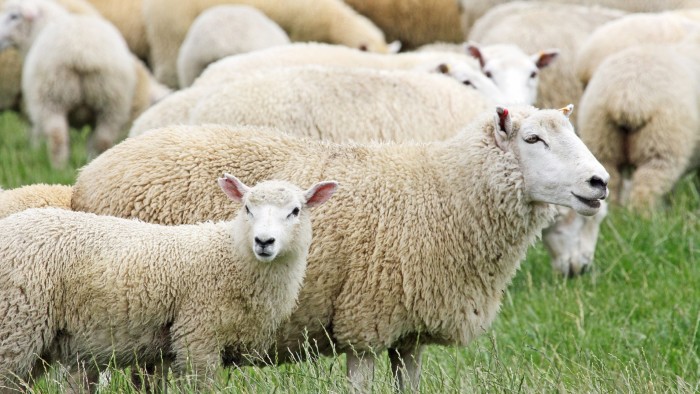Stay informed with free updates
Simply sign up to the Climate change myFT Digest — delivered directly to your inbox.
Leading climate scientists have accused politicians in New Zealand and Ireland of using an “accounting trick” to back their sheep and cattle industries, warning their support for methane-emitting livestock could undermine global efforts to fight climate change.
In an open letter shared with the Financial Times, 26 climate scientists from around the world warned that New Zealand’s proposed new methane targets risk setting a dangerous precedent. Scientists have separately raised concerns about Ireland’s approach.
Governments with large livestock sectors, including those of Ireland and New Zealand, are increasingly using a new method for calculating methane’s effect on climate change, which estimates its contribution to warming based on how emissions are changing relative to a baseline.
This differs from the long-established approach, which compares the total warming impact of a given mass of methane to the same mass of CO₂ over a 100-year period.
Proponents argue the newer method, known as global warming potential star (GWP*), better reflects methane’s shortlived nature in the atmosphere compared to the long-lasting effects of CO₂.
But scientists warn that some governments are misapplying it to justify “no additional warming” targets, which allow emissions to remain flat rather than decline — potentially enabling high levels of methane emissions and climate damage to continue.
“It’s like saying ‘I’m pouring 100 barrels of pollution into this river, and it’s killing life. If I then go and pour just 90 barrels, then I should get credited for that’,” said Paul Behrens, global professor of environmental change at Oxford university and a signatory of the letter.
Drew Shindell, professor of climate science at Duke University and another signatory, said assessing future emissions purely in terms of the difference from current levels can amount to an “accounting trick” when misused.
That “lets you off the hook, and ‘grandfathers in’ any emissions that are already going on”, he said.
New Zealand and Ireland are among the world’s highest per capita agricultural methane emitters, largely due to their export-focused meat and dairy industries.
In New Zealand, agriculture accounts for nearly half of total greenhouse gas emissions, primarily from livestock. Ireland’s agriculture sector is its largest emitter, with dairy cows producing significantly more methane per animal than beef cattle.
The scientists’ letter argues the approach preferred by Dublin and Wellington could set a precedent, allowing other countries to justify minimal reductions in methane emissions and jeopardising commitments under the 2015 Paris Agreement as well as the Global Methane Pledge, which was launched in 2021.
Paul Price, a climate change researcher at Dublin City University, said Ireland needs sharp near-term cuts in agricultural methane to have any chance of limiting warming to 1.5°C, as called for under the Paris Agreement. Instead, he said, the country is expanding production — “exactly the opposite” of what’s needed.
While herd sizes have declined elsewhere in Europe, the number of dairy cows in Ireland has increased over the past 15 years, according to the country’s state agricultural research agency.
New Zealand is expected to formalise new methane targets later this year, following a government-commissioned review suggesting reductions of 14 to 24 per cent by 2050 would suffice under the “no additional warming” goal.
This is lower than the 35-47 per cent cuts recommended by the country’s Climate Change Commission.
The governments of Ireland and New Zealand did not respond to request for comment.
Myles Allen, professor of geosystem science at Oxford university’s physics department and one of the scientists behind GWP*, said governments — not scientists — must decide whether farmers should undo past warming from herd growth.
He supported separate targets for methane and CO₂, calling the older approach “a dodgy speedometer” that overstated emissions and was slow to reflect real changes.
But scientists behind the letter said that the weaker methane target could act as a tool to justify richer and higher-emitting countries failing to lead the way in cutting emissions.
“If you’re a rich farmer that happens to have a lot of cows, then you can keep those cows forever,” said Shindell. This approach “penalises anybody who’s not already a big player in agriculture”, including “poor farmers in Africa that are trying to feed a growing population”.
